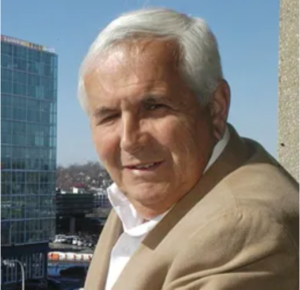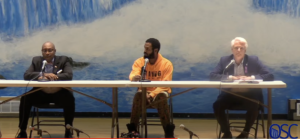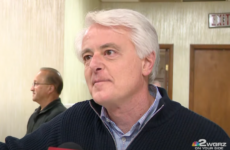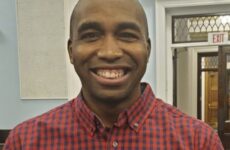By Tony Farina
The New York Coalition for Open Government has long called on Mayor Robert Restaino to stop calling so many special sessions with the council where the public cannot comment on the issues of the day, effectively being shut out from participating on important matters at the special meetings.
“Most public bodies in New York allow the public to speak,” according to Paul Wolf, president of the coalition, and if there was any consensus at Wednesday night’s council and mayoral debates, it was in agreement with the idea of not closing meetings to public input to handle Restaino’s agenda.
“We need to build bridges and transparency,” said Carl Cain, the Republican candidate for mayor and a retired deputy police chief. “We need to start working with the council, not against them.”
Cain said voters need to employ a simple test to help them make their decision on mayor.
Is the city better now under Restaino, asked Cain. “Does it pass the smell test, the eye test, the feel test,” said Cain, asking if residents feel better about the city, given all crime, infrastructure, and development problems that seem to dominate city life.
There was little common ground in the two debates beyond the special meetings issue with sharp divisions on the “two-project solution” between the mayor’s unfunded $150-million events center (Centennial Park) and NFR’s $1.5 billion digital date center project, both targeted for the same 10-acre parcel owned by NFR and the subject of eminent domain proceedings by the city to take control of the land.
Mayor Restaino defended his events center plan, saying he expects state financial backing, as has happened in other Western New York communities, once he has secured the land. It should be noted that what Restaino doesn’t have that others such as Watertown has is private investment.
“We been there, done that,” said Restaino, saying NFR has not put up anything in decades despite owning more than 140 acres of city land.
“We must be business friendly,” said Cain, “and roll out the red carpet for development, not red tape,” echoing the strong message from council candidate Vincent Cauley. Cain endorsed the huge potential for jobs and the millions in economic impact to the city with the data center project.
Councilman Cauley, one of two Republican candidates for two open seats on the council where he now serves under appointment, supports the NFR project, saying private sector investment is key to the city’s future and helping the city make advancements across the board. Cauley says crime and jobs are two recurring themes he hears from residents in his door-to-door campaign.
Mike Gawel, the second GOP candidate for the two open council seats, had several bright moments in the council debate and it was his view that both projects have a lot of questions but he’s interested in hearing more and perhaps finding a way to make both projects work with the right level of cooperation, something that usually seems lacking in Niagara Falls politics and something he is committed to promote if elected Nov. 7.
The two Democratic candidates for council had reservations about NFR’s data center plan despite the potential for enormous job creation that it might bring.
Brian Archie left the door open to the data center proposal while the other Democratic candidate, Jim Perry, continued to throw shade at NFR, saying it has little to show for its history as a land owner in Niagara Falls, the same theme that dominated Mayor Restaino’s opposition to NFR’s $1.5 billion plan, saying he will get the money for his project eventually despite claims from his opposition that it will cost taxpayers big to support his events center.
The mayor said he is committed to dealing with poverty in the city, citing his various programs, but Cain said not enough is being done to curtail crime and get police and the community on the same page.
“Again, my theme is building bridges on all fronts,” said Cain. “We must do more to combat poverty and bring work to our citizens,” suggesting the mayor has fallen short in controlling crime, fixing roads and sidewalks, and in other areas of quality of life that make a city a good place to live.
“It just doesn’t pass the test, no matter which one you use,” said Cain.






















